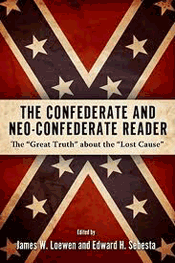About this time 150 years ago, Abraham Lincoln was elected president, an event so fraught with peril for southerners that within months, 11 states had seceded from the Union. While the cause of that secession was clear to everyone back in 1860 and 1861, the topic provokes all kinds of argument and disagreement today.
Mississippi's most recent experience in trying to resolve this question came in the spring of 2001 when voters went to the polls to determine the status of the state flag. People from all walks of life stood up in public hearings in all parts of the state and argued that preservation of "states' rights" was the reason for secession and, of course, the Civil War.
To bring clarity to this subject, James W. Loewen and Edward H. Sebesta have done what historians do best—they returned to the resolutions, speeches, letters and other documents that were produced at the time of secession. More than 100 are included in their new book, "The Confederate and Neo-Confederate Reader: The ‘Great Truth' About the ‘Lost Cause'" (University Press of Mississippi, 2010, $55). The key documents are the articles of secession each state adopted to justify its departure from the Union.
Mississippi's is quite clear: "In the momentous step which our State has taken of dissolving its connection with the government of which we so long formed a part, it is but just that we should declare the prominent reasons which have induced our course. Our position is thoroughly identified with the institution of slavery, the greatest material interest of the world. Its labor supplies the product which constitutes by far the largest and most important portions of the commerce of the earth. These products are peculiar to the climate verging on the tropical regions, and by an imperious law of nature none but the black race can bear exposure to the tropical sun. These products have become necessities of the world, and a blow at slavery is a blow at commerce and civilization."
Loewen and Sebesta also include a number of speeches made before, during and immediately after the war. They all embody a single theme: the need to protect the institution of slavery. On April 29, 1861, Jefferson Davis delivered one of the most important speeches of the time, when he urged the Confederate Congress to adopt the proposed Confederate Constitution. The speech was a long one, though clearly Davis felt the need to lay out in great detail the historical events that led to secession. The entire speech was about slavery.
In this excerpt, Davis took great pains to defend the practice: "Under the mild and genial climate of the Southern States and the increasing care and attention for the well-being and comfort of the laboring classes, dictated alike by interest and humanity, the African slaves had augmented in number from about 600,000 at the date of the adoption of the constitutional compact to upward of 4,000,000.
"In moral and social condition they had been elevated from brutal savages into docile, intelligent and civilized agricultural laborers, and supplied not only with bodily comforts but with careful religious instruction. Under the supervision of a superior race their labor had been so directed ..."
What comes across after reading the documents Loewen and Sebesta have compiled is the clear sense that southern leaders were proud of what they had accomplished on the backs of millions of slaves. They had convinced themselves that white was superior to black, even ordained and blessed by God.
One southern leader the authors didn't include—I assume for reasons of space—was the Mississippi governor who took his state into the Confederacy: John Pettus.
Soon after Lincoln's election, Pettus convened a special session of the Legislature on Nov. 26, 1860, to urge secession: "I have convened you in extraordinary session, to take into consideration the greatest and most solemn question that ever engaged the attention of any Legislative body on this Continent ... The existence or abolition of African slavery in the Southern States is now up for a final settlement before that tribunal which has exclusive jurisdiction—the people of the Southern States where it exists."
"The Confederate and Neo-Confederate Reader" serves another useful purpose. It uses speeches, letters and other documents from the years after the war to demonstrate how southerners began to supplant slavery with other, more noble issues as they went about the business of glorifying "The Lost Cause." The willingness of professional historians, textbook publishers and history teachers to accommodate that masquerade was not their finest hour.


